 The category of Best Supporting Actress has an unfortunate history of being the site where Academy voters most readily succumb to their heraldic instincts, using a nomination in the category to announce the "next big thing" in actressness. Alas, as any number of younger nominated actresses might tell you, the Academy is very rarely right and the list of generally competent one-nom/one-win wonders in this category is formidable. (Moreover, the very existence of this list has contributed instrumentally to a journalistic cliche that stands among my greatest pet peeves, the so-called "Supporting Actress Curse.") Occasionally, however, the Academy's heraldic impulse does strike gold, as in the case of...
The category of Best Supporting Actress has an unfortunate history of being the site where Academy voters most readily succumb to their heraldic instincts, using a nomination in the category to announce the "next big thing" in actressness. Alas, as any number of younger nominated actresses might tell you, the Academy is very rarely right and the list of generally competent one-nom/one-win wonders in this category is formidable. (Moreover, the very existence of this list has contributed instrumentally to a journalistic cliche that stands among my greatest pet peeves, the so-called "Supporting Actress Curse.") Occasionally, however, the Academy's heraldic impulse does strike gold, as in the case of...
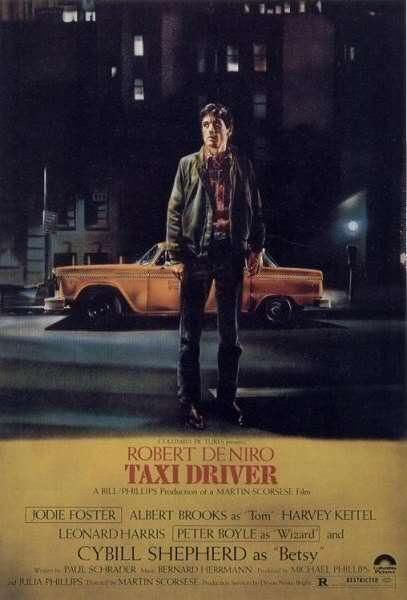
...Jodie Foster in Taxi Driver (1976)
approximately 15 minutes and 48 seconds
8 scenes
roughly 10% of film's total running time
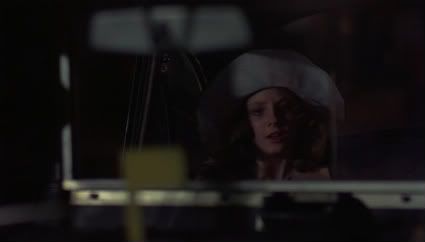 Travis's first encounter with Iris comes when she leaps into the backseat of his cab, demanding that he take her away. Caught off guard, and mildly flummoxed by the spectacle of Iris in his backseat, Travis balks just long enough for Iris's pimp (a bizarre, bewigged Harvey Keitel) to wrest her from the car and toss a grubby $20 bill as thanks.
Travis's first encounter with Iris comes when she leaps into the backseat of his cab, demanding that he take her away. Caught off guard, and mildly flummoxed by the spectacle of Iris in his backseat, Travis balks just long enough for Iris's pimp (a bizarre, bewigged Harvey Keitel) to wrest her from the car and toss a grubby $20 bill as thanks.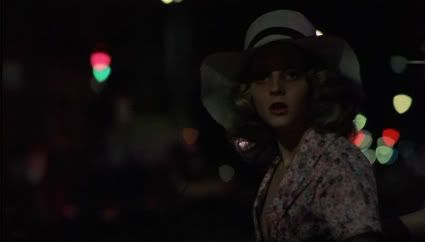 Something about the encounter gets under Travis's thin skin. So much so that, when he nearly runs into Iris another evening, an obsession is borne, as Travis seeks the opportunity to do what he should have done that first night and take Iris away from life on the street.
Something about the encounter gets under Travis's thin skin. So much so that, when he nearly runs into Iris another evening, an obsession is borne, as Travis seeks the opportunity to do what he should have done that first night and take Iris away from life on the street.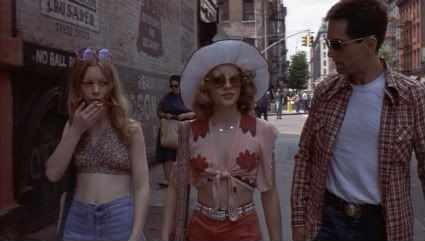 The film draws upon Foster's unique charisma in this period -- that of an improbably self-possessed child, the sort of kid whose deft mix of verbal dexterity and preternatural confidence readily cows most adults into forgetting that the kid's still a kid. Of course, with Foster, this particular brand of precocious charisma is typically funneled through the actress's most tomboyish charms. Director Scorsese (along with costume designer Ruth Morley) address Foster's peculiar adrognyny by literally festooning her with incongruous garments and accessories. An assortment of wide-brimmed hats and patent leather platform shoes -- hiphuggers, halters, and hot pants -- all combine into a set of outfits that fee like a roughly pasted collage, a child's vision of adult glamour as torn from a magazine.
The film draws upon Foster's unique charisma in this period -- that of an improbably self-possessed child, the sort of kid whose deft mix of verbal dexterity and preternatural confidence readily cows most adults into forgetting that the kid's still a kid. Of course, with Foster, this particular brand of precocious charisma is typically funneled through the actress's most tomboyish charms. Director Scorsese (along with costume designer Ruth Morley) address Foster's peculiar adrognyny by literally festooning her with incongruous garments and accessories. An assortment of wide-brimmed hats and patent leather platform shoes -- hiphuggers, halters, and hot pants -- all combine into a set of outfits that fee like a roughly pasted collage, a child's vision of adult glamour as torn from a magazine.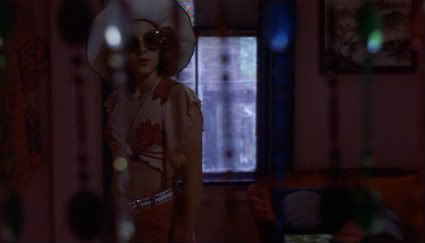 Iris's costume matters because it's through the fleeting but memorable glimpses of the character that makes her stand out among the many urchins crawling the New York streets at night. This permits both Travis (and us) to develop a fixation on this curious creature working the streets, infusing Travis's certainty that he must "rescue" this girl -- even before he knows her name, her age, or whether or not she really wants to leave "the life."
Iris's costume matters because it's through the fleeting but memorable glimpses of the character that makes her stand out among the many urchins crawling the New York streets at night. This permits both Travis (and us) to develop a fixation on this curious creature working the streets, infusing Travis's certainty that he must "rescue" this girl -- even before he knows her name, her age, or whether or not she really wants to leave "the life."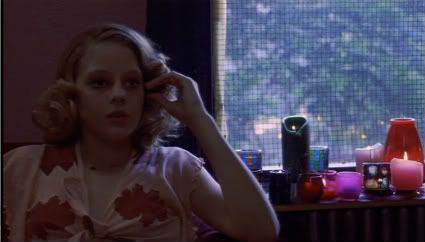 The first real encounter between Iris and Travis -- wherein DeNiro pays Iris's coterie of pimps so he can have some time alone with her -- is a strange cross between an intervention, a sleazy assignation and a tender first date. In this scene, De Niro and Foster subtly convey how naive both characters are. Each knows two or three "scripts" for social interaction, only two or three ways to be with a person of the opposite sex. De Niro's Travis violently rebuffs Foster's Iris and her sexual provocations; Foster's Iris quickly regroups and tries talking to De Niro's Travis like he's having a bad trip even as he sincerely attempts to explain himself to her; finally, the two find a shared groove in the cliches of politeness as they make a proper "date" for breakfast the following afternoon.
The first real encounter between Iris and Travis -- wherein DeNiro pays Iris's coterie of pimps so he can have some time alone with her -- is a strange cross between an intervention, a sleazy assignation and a tender first date. In this scene, De Niro and Foster subtly convey how naive both characters are. Each knows two or three "scripts" for social interaction, only two or three ways to be with a person of the opposite sex. De Niro's Travis violently rebuffs Foster's Iris and her sexual provocations; Foster's Iris quickly regroups and tries talking to De Niro's Travis like he's having a bad trip even as he sincerely attempts to explain himself to her; finally, the two find a shared groove in the cliches of politeness as they make a proper "date" for breakfast the following afternoon.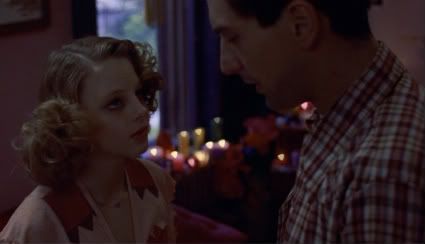 Through this sequence of quick changes, both actors -- with twenty years age difference between them -- aptly convey how both Iris and Travis are basically kids lost in the city, each enmeshed in the trappings of playing a devastating game of grownup.
Through this sequence of quick changes, both actors -- with twenty years age difference between them -- aptly convey how both Iris and Travis are basically kids lost in the city, each enmeshed in the trappings of playing a devastating game of grownup.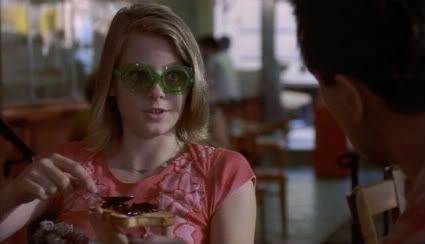 Foster, however, truly shines in the following scene, when Iris and Travis meet for a date. In this scene, without the hairspray or the curls, we see Foster flirting with Travis in a totally different way, switching in and out of different pairs of outlandish shades as she shows off her knowledge of the zodiac, her interest in living on a commune, and her refusal to be "square."
Foster, however, truly shines in the following scene, when Iris and Travis meet for a date. In this scene, without the hairspray or the curls, we see Foster flirting with Travis in a totally different way, switching in and out of different pairs of outlandish shades as she shows off her knowledge of the zodiac, her interest in living on a commune, and her refusal to be "square." 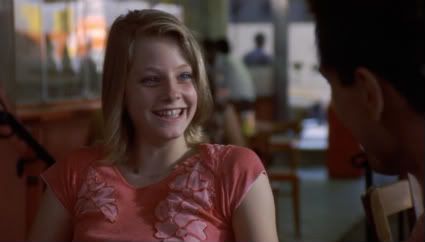 Foster moors this scene -- the single scene in the film in which De Niro's Travis is able to sustain a give-and-take conversation with another person -- in a way that proves essential. As she privately toys with the idea of Travis being her new boyfriend, Foster's Iris cues us into a simple truth of the story: Neither Iris nor Travis are goners -- yet. They've both gotten lost and, in each other, have found a clue to the possibility of redemption. It's a scene startling in its apparently tragic incongruity but also deeper than we can yet know.
Foster moors this scene -- the single scene in the film in which De Niro's Travis is able to sustain a give-and-take conversation with another person -- in a way that proves essential. As she privately toys with the idea of Travis being her new boyfriend, Foster's Iris cues us into a simple truth of the story: Neither Iris nor Travis are goners -- yet. They've both gotten lost and, in each other, have found a clue to the possibility of redemption. It's a scene startling in its apparently tragic incongruity but also deeper than we can yet know.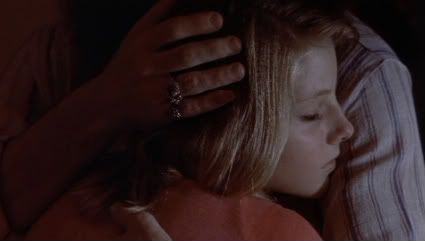 Of course what happens next is awful. Foster's Iris falls back into the arms of her deftly manipulative pimp. De Niro's Travis continues his pharmaceutically-fueled quest for blood vengeance.
Of course what happens next is awful. Foster's Iris falls back into the arms of her deftly manipulative pimp. De Niro's Travis continues his pharmaceutically-fueled quest for blood vengeance.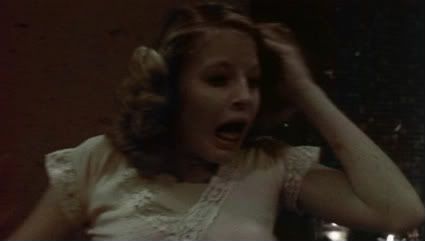 Of course, De Niro's Travis doesn't have the best luck as an urban commando, and things get really bloody, really quickly, especially when he arrives to rescue Foster's Iris.
Of course, De Niro's Travis doesn't have the best luck as an urban commando, and things get really bloody, really quickly, especially when he arrives to rescue Foster's Iris.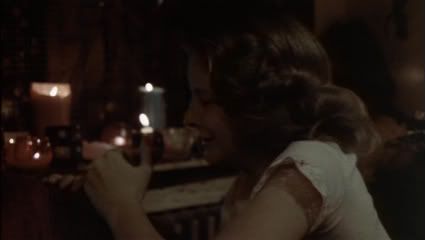 Yet, when all is said and done, Travis does indirectly rescue Iris, and possibly himself. What's more interesting is that, as we hear the painfully awkward thankyou letter from the Smeesmas's, it's Foster's performance -- her strange maturity, her tangible integrity -- that helps us to believe that Foster's Iris might yet find a way out of the mess her life has become.
Yet, when all is said and done, Travis does indirectly rescue Iris, and possibly himself. What's more interesting is that, as we hear the painfully awkward thankyou letter from the Smeesmas's, it's Foster's performance -- her strange maturity, her tangible integrity -- that helps us to believe that Foster's Iris might yet find a way out of the mess her life has become.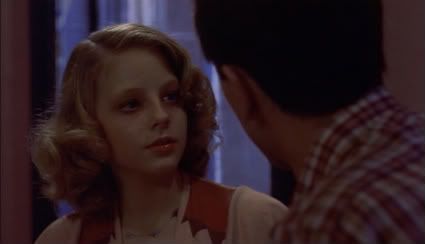 While I don't know that I would count Foster's work as truly great, it is undeniably, impressively effective. Layering just enough integrity (and not too too much intelligence), Foster matches De Niro in every moment to transform what might have been a hollow holograph of a character (hi, Cybill Shepherd!) and instead crafts Iris as a plausibly human person. A formidable accomplishment at age fourteen, indeed.
While I don't know that I would count Foster's work as truly great, it is undeniably, impressively effective. Layering just enough integrity (and not too too much intelligence), Foster matches De Niro in every moment to transform what might have been a hollow holograph of a character (hi, Cybill Shepherd!) and instead crafts Iris as a plausibly human person. A formidable accomplishment at age fourteen, indeed.

2 comments:
I've been tough on the kid :) she was ok.
however, Cybill sucked big time indeed.
excellent work by foster...a masterclass...if straight had not won, then it should have gone 2 jodie...an accomplishment that was seemingly way beyond her mere 14 yrs of age @ the time...amazing!
Post a Comment